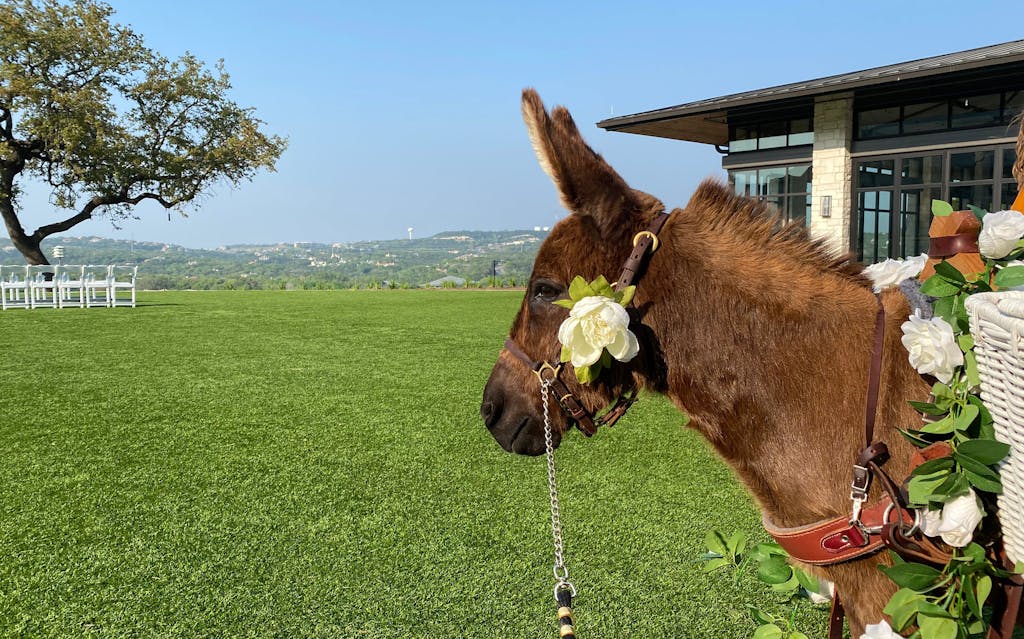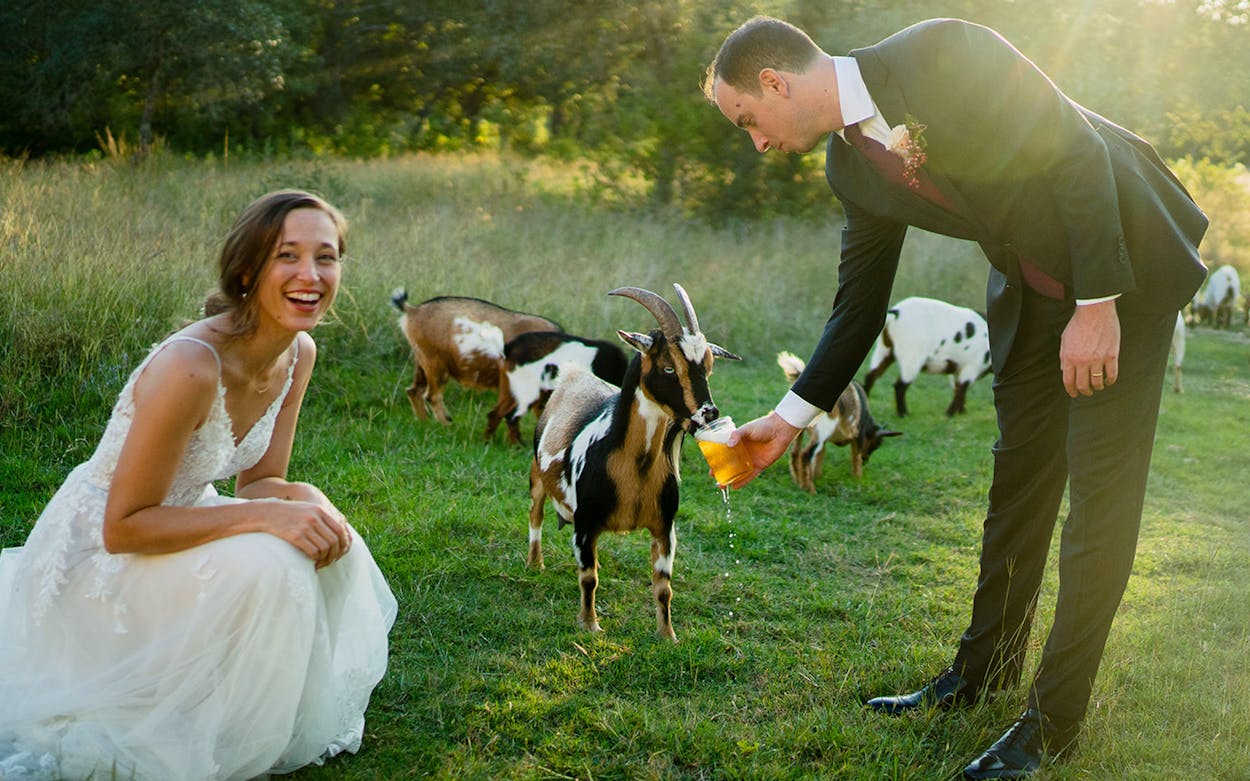The first goat crash was unintentional, the goats’ caretakers tell me. Jester King, the oft-Instagrammed Hill Country brewery, farm, and event space thirty minutes west of Austin, maintains a herd of Nigerian dwarf goats that is now 75 strong. On a sunny Thursday afternoon in March, several kids (baby goats) born in the last five weeks are playing on a platform near the entrance to Jester King’s large goat pen. They are constantly in motion, butting heads with and mounting one another. The former is play, and the latter is meant to establish dominance, explains head goat shepherd Lissa Rowe. She’s wearing a tie-dyed shirt and bike shorts and has thin, gold-framed glasses. Rowe has a gentle confidence that I imagine comes from handling livestock all day. Behind her, some of the baby goats, who barely rise to my midcalf, take joyful leaps from the platform, their legs flying to one side as if doing a cloven-hoofed heel click.
Their main duty is fertilization: each goat can dispatch more than a pound of manure into the soil each day. Their secondary duty is bein’ cute, and for an extra fee ($300), the herd will offer its services at your Jester King event.
“We were grazing the goats one day during a wedding, and as much as generally we try to direct them, they had wandered off and gotten away, and went to crash a wedding,” explains farmer Phil Green. He is tall and wears a psychedelic Jester King T-shirt and green plastic–framed glasses. A bandanna around his forehead keeps two shoulder-length braids in place. The overall impression is that of a less existentially burdened David Foster Wallace. “But instead of the wedding party being upset, they were thrilled to have the goats show up, and it was exciting. And then we realized, Hey, there might be a market for this.”
That was two years ago, and now, Green says, most couples planning weddings at Jester King opt to have goat crashes, in which the herd arrives during a reception to the delight (and surprise, because guests generally don’t know the goats are due) of all. For a while, guests could feed the goats beer, which is very nutritious for ruminants, until a goat named Ted ruined it for the whole herd.
“He was a bit demanding, a little rude,” says Rowe.
“He had some behavior that was very pushy,” agrees Green, “but also, anytime someone was giving beer, he would be there”—same—“so he was putting himself at risk for being overserved.”
One evening, unbidden, a troop of goats crashed a rehearsal dinner in a more private area on the property. Among them was Ted, a white goat with a striking blond beard and long, light horns, who has approached innocently and is now standing between Rowe, Green, and I, unobtrusive but well positioned to get something, should there be something to be gotten. “Ted likes to get up on the table and steal drinks,” Rowe continues. “And he—no joke—got on the table, grabbed a drink from a plastic cup, and threw it back. I’m not even kidding. I mean, most of it just went all over him. But he knew the assignment.” Ted looks straight ahead past Rowe’s legs, unbothered.
Though animals are traditionally included in wedding ceremonies in many cultures, such as the horse or elephant often hired for the baraat, a procession preceding many Indian weddings, in the past decade, animals have entered the mainstream in the United States, deployed for weddings, corporate events, and beyond. Texas, and the Hill Country in particular, seems to have emerged as the epicenter of cocktail livestock—of three weddings I’ll attend in the Austin area in the next few months, two will have critter accompaniments.
Goats, in particular, are everywhere. They’re crashing bachelor and bachelorette parties, yoga classes, and, thanks to one Austin purveyor, boating trips. Drew Haas provides captained boat charters on Lake Austin for $225 per hour, with the option to include two goats for $196 extra. (Haas takes bookings through his company, the Party Goat, as well as the rental app GetMyBoat.) Of the dozens of charters he’s booked so far for the year—he’s scheduled one or two per week from the end of this month until September, a time period coinciding with the peak of the southern migration of neon-hued bachelorettes and their devotees—“almost every one of them has booked the goats.”
Haas credits the recent ubiquity of goat yoga, in which baby goats climb on yogis as they pose, with the grander boom in goat-inclusive events. The animals’ novelty helps Haas set himself apart in the area’s competitive charter-boat market. He grew up in Hallettsville, a town squarely set between Houston and San Antonio, where he’d spent a lot of time with animals as a kid (human). He and his girlfriend moved back there during the COVID-19 pandemic, and he bought her a baby goat for her birthday. His name was Peanut, and though he was aesthetically a goat, he was a dog in temperament and a sailor in his heart. Shortly thereafter, Haas bought a pontoon boat with a friend and decided to start a rental company. Peanut was sitting in the living room in a diaper as they tried to decide what to name the company, and the Party Goat was born.
Peanut came out on the boat often, even clip-clopping out onto the floating mat Haas would unfurl. Haas experimented with including him on rental charters, but he found that as Peanut got bigger, minding him and the guests simultaneously was too chaotic. Haas bought two more baby goats and brought them out on the boat, which went poorly: “I tried to catch them for two hours,” he recalls. Last summer was one of trial and error, as Haas experimented with diapers—the adult goats’ poop is rabbity and firm, easy to clean up should it present itself, but the kids’ is messier—and canopies, which are especially vital in Texas’s warmest months. (The goats are not aboard for longer than one hour, and there are spaces where they can retreat if they become overwhelmed by the attention or the heat.) Ultimately, Haas began outsourcing goats on an hourly basis from a Lockhart-based company called Goat Shenanigans. “We tried it a couple of times last year and it went great,” Haas says. “I was like, ‘Okay, let’s do this.’ ”

Goats are not the only livestock to join the party. For several hundred dollars—costs vary based on season and distance traveled—Ears With Beers, based in Dripping Springs, will furnish your wedding’s cocktail hour with two miniature donkeys named Carrie and Spirit, each toting two baskets of drinks. (They carry spirits—geddit?) Ears With Beers owner Paula Boyer says she can tell the donkeys are satisfied in their work because as soon as they spot her carrying their booze baskets out to her truck, they begin pushing on their gate. She can also tell, she adds, “because donkeys, if they don’t want to do it, they’re not going to do it.” Donkeys are smart—smarter than horses, Boyer says—and though hers are miniature, they still weigh 250 pounds each, and Boyer is a small woman. “Sometimes we say they’re ‘buffering,’ ” Boyer says of the long moments donkeys spend evaluating whether a request is worth their time. “You can’t rush them or pressure them.”
Nevertheless, donkeys are pleasant, gentle reception guests—though Boyer warns brides and flower girls that they love to play with fluffier wedding dresses, “booping the poof” with their noses—and companies’ “beer burros” have proliferated around the state. A perfunctory search yields six such ventures in the Hill Country alone. Boyer particularly appreciates how comfortable the donkeys make wedding guests who are attending alone, and during wedding cocktail hours, she and her cohandlers will steer the donkeys toward solo guests who look adrift. Boyer also volunteers at an equine therapy ranch and participates in her church’s comfort dog ministry, which brings dogs to communities where tragedies have occurred. “I can see how it reduces stress,” she says, “how it gives people confidence.” The donkeys don’t often carry distilled spirits anymore, says Boyer, whose enthusiasm for wordplay is evident throughout our conversation, but they do uplift spirits. (Of her “no party pooper insurance policy,” which mandates bags underneath Carrie’s and Spirit’s tails to catch any deposits, Boyer says: “Our little asses are covered.”)
For those wedding havers for whom goats and donkeys do not provide adequate novelty, many venues around the state will incorporate wilder critters into ceremonies and receptions. A company in La Grange, Texas Party Animals, offers trained alpacas, which chaperone cocktail hours with the pert expressions of your most judgmental aunt. Blue Hills Ranch, just southwest of Waco in McGregor, offers brides and couples opportunities for photo sessions with the resident giraffes, as does the San Antonio Zoo. In one such photo, an ethereal bride studies a frond in her hands while a giraffe looks on expectantly behind her, as though they’re about to have a magical first-look moment.
A walrus may soon supplant the wedding officiant. But as with other animal-adjacent experiences that lend themselves to photo opportunities—legions of bros posing with sedated tigers for their Tinder profiles, families traveling to poorly run roadside zoos masquerading as rescues—it’s important to vet those providing the talent for your Jumanji wedding. Bad actors abound, and I don’t mean the odd beer-crazed goat.
“You always just want to make sure you do your research,” Rowe says. Behind her in Jester King’s pen, several goats gather atop a picnic table, plotting. “What do they do with the animals when they’re not babies anymore?” Rowe continues blithely, unaware of the apparent coup a-brewing behind her.
Those who choose to include animals in their events should remember that the critters’ employment is at will, and even the best-laid planimals are subject to change. Jester King, for instance, has in the past year experienced an upset within its herd, as the longtime queen, Luna—the herd is a matriarchy—has stopped “displaying those leadership qualities,” Rowe explains. Luna, a fabulous white goat, has assumed a sphinxlike pose near one side of the pen, flanked by two of her offspring. I can tell by looking at her that she would never deign to participate in goat yoga.
Luna is stepping back from her queen role, Rowe says, and she often separates herself from the herd due to the stress of it. “But some of them will still follow her. So it makes going to events consistently and having the whole herd there a little bit harder.” Thankfully, half a herd is still a party.
- More About:
- Style & Design
- Critters
- Austin








